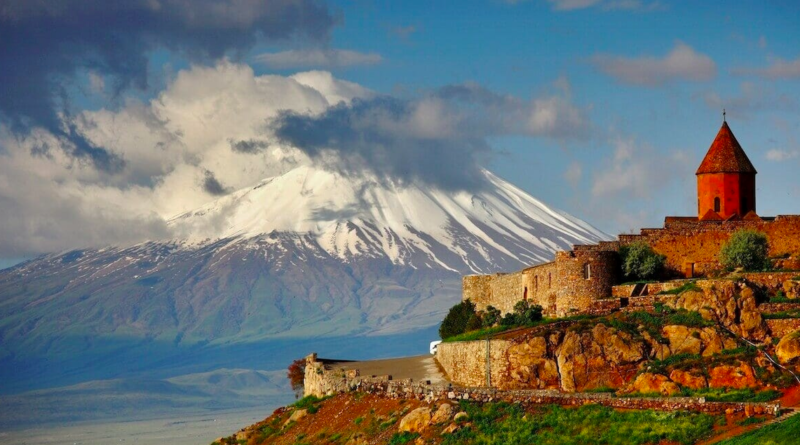INTERVIEW: New PBS doc focuses on history, cultural voices of Armenia
Photo: Armenia, My Home, directed by Andrew Goldberg, is currently airing on PBS and PBS Passport. Featured in the documentary are Khor Virap monastery and Mount Ararat. Photo courtesy of PBS / Provided by Smithhouse with permission.
Armenia, My Home, the new documentary from Emmy-winning director Andrew Goldberg, is currently airing on PBS stations around the country and also on PBS Passport. The film, narrated by award-winning actor Andrea Martin, takes a deep dive into the beauties of Armenia, from its unique landscapes to its mountain monasteries. There are also scenes focused on the Christian history of the country and sad chapters of its past, including genocide and war. Throughout the film, cultural voices of Armenians and Armenian Americans are featured, showcasing how the country and its diaspora continue to thrive well into the 21st century.
For Goldberg, founder and owner of So Much Film in New York City, the project began with a pitch to PBS.
“I was talking to PBS, trying to come up with some new ideas of what kind of shows might be interesting,” Goldberg said in a recent Zoom interview. “Years ago there was a series PBS had done called Visions, and they had flown in a helicopter over some countries in Europe. I don’t know if it was hugely successful, but I thought with drone photography, we have such an incredible technology that we didn’t have back then that [is] much more affordable than a helicopter, which burns up $5,000 a day.”
Goldberg, who produced and directed The Armenian Genocide for PBS, wanted to ensure that the film wouldn’t simply be stunning visuals captured via drone cameras, which he said could get boring quite quickly. Instead, he wanted that particular footage to be interwoven with interviews of people who talk about the music, art, history and culture of the country.
“So I pitched them on Armenia because I had done some Armenian projects in the past and also another one on Israel,” he said. “We’re moving ahead on both of them. The trouble with the Israel one, obviously, I can’t shoot that right now. If you fly a drone up in the air, it’ll get shot out of the sky, so that’s not going to happen. So these were the two countries that I pitched, and I’d like to do more of them on other countries. But Armenia was great because it really is a country like no other. That made it a lot of fun.”
Goldberg called Armenia the “unknown jewel” in the world. He said that the people of the country welcomed him and his production team with open arms, adding that there’s a domestic enthusiasm for visitors that one often doesn’t find in other countries. He was welcomed into homes and fed with some of that world-famous Armenian cuisine.
“They love to feed you,” he said with a laugh. “That happens immediately. They’re very enthusiastic. It’s a very small country, and there’s not a lot of people. They really view it as their home, not just where they live.”
Throughout the piece, there are many themes that emerge. One of them focuses on the Christian roots of this country, and Goldberg’s cameras capture that history by focusing on monasteries and churches sprinkled throughout the cities and countrysides.
“I think Armenia is in many ways defined by its relationship to Christianity,” the director said. “I think a lot of other countries are Christian, are Muslim, are Hindu, but they don’t necessarily view both their ethnic and national identity through that lens in a way that Armenia does because of its long, long history. Armenia was the first country to adopt Christianity, so it’s technically the first Christian nation, actually before the Roman empire. And that’s a really remarkable thing. It was in the year 301 that they adopted Christianity, and in many other countries it happened much, much, much later. That created the Armenian church, and the Armenian church has been a defining institution. And let me point out one other thing, which is that because so many people have tried to kill off the Armenians over the years, they have looked for things in their culture to survive, and the church is one of them. So the church is not just a religious tool, but it’s a tool of cultural survival and cohesion.”
Goldberg amassed a truly remarkable set of voices to bring Armenia’s story to life. Included among the subjects are Eric Bogosian (Succession); author Chris Bohjalian (HBO’s The Flight Attendant); Pulitzer Prize-winning author Peter Balakian (Black Dog of Fate); journalist Araksya Karapetyan (Good Day LA); author Dawn Anahid Mackeen (The Hundred-Year Walk); Conan O’Brien’s famed assistant Sona Movsesian; and Bishop Mesrop Parsamyan, primate of the Eastern Diocese of New York, according to press notes.
“We very specifically chose people that used the tools of their life, so to speak, their jobs or their passions as a way that expressed both their identity and their identity as Armenians,” Goldberg said. “This is why we have writers, poets, artists and why we don’t have, for example, engineers. Michael Aram, he creates artwork that physically represents a lot of things to him that tie into his Armenian past. Ron Suny is a professor of history, and he’s lectured and taught courses on Armenian history. Peter Balakian is a poet who writes about Armenian issues. Chris Bohjalian is a novelist. Dawn Mackeen is a journalist. … They all take their Armenian identity, and they express it artistically, culturally in these ways. I wanted to get people that could do that.”
By John Soltes / Publisher / John@HollywoodSoapbox.com
Armenia, My Home, directed by Andrew Goldberg, is currently playing on PBS stations around the country and on PBS Passport. Click here for more information.

